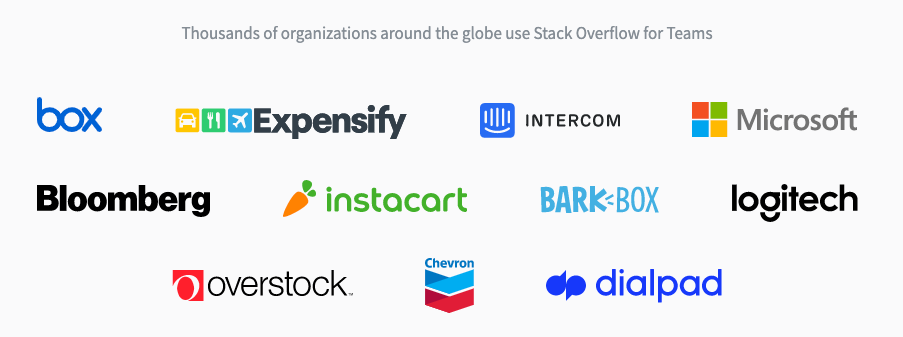Here in the US there’s optimism around our ability to recover from the COVID-19 pandemic this year, thanks to our vaccination efforts. We are also seeing positive momentum in the UK, where we have our second office. After seeing vaccination sites around the city in which I am based, and reading about companies safely bringing portions of their staff back to the office, I can’t help but hope I will get to reunite face-to-face with some of our Stackers before the end of the year. But there is still considerable work to be done, especially around the world in countries like India and Brazil which continue to experience the devastating impact of COVID-19.
There is optimism within Stack Overflow right now as well. We are continuing to build momentum as the company grows. We just closed out the first quarter of 2021, and thanks to the hard work of Stackers across the board, we surpassed our most optimistic financial projections. I want to thank everyone for the effort that made this possible, and talk a little bit about what comes next.
We went into this year focused on two strategic priorities. Along with our mission and our core values, we let them guide us in all that we do. They are Product-led Transformation and Predictable and Reliable Financial Performance, both of which add value to our community and our customers by allowing us to continue to support and resource them better, and ultimately continue to make this a rewarding place to work.
I am going to focus the majority of this quarterly blog on those priorities. Like we did last quarter, our chief product and technology officer Teresa Dietrich will soon share a blog post on updates to Community Health and Growth—one of the key foundations these priorities are built upon, as well as updates on our products.
Continuing our Product-led Transformation
A lot of SaaS-focused technology companies talk about being product-led. What does that mean? It means putting your product and user at the center of all you do, and leveraging your product to attract, activate, and retain your customers. At Stack Overflow, that means more than continuing to invest in our Stack Overflow for Teams product. It means ensuring that our focus, whether it’s on Teams or on the public platform, solves problems for our core users: developers and technologists.
In March, we announced a big milestone in our product-led transformation: a new freemium tier within Stack Overflow for Teams. Users who create a new instance of Teams can grow it up to 50 seats without paying anything, and they get access to most of the product’s key features, such as integrations with Slack and Microsoft Teams. We hoped to sign up about 2,000 new Teams during our first month of freemium, but saw over 10,000 new Teams created instead. This is a phenomenal validation of the product and the strategic work that went into this decision.

For many of the top companies using Stack Overflow for Teams, interest started with individual contributors, with developers who wanted a better tool to collaborate and share knowledge. We hope that making Stack Overflow for Teams totally free for up to 50 users enables more developers to experiment with our product and prove out its value, eventually leading to broader adoption within an organization.
Freemium isn’t the only product-led development we’ve made over the last few months. If a user within a free Team is looking to graduate to the next tier, we’ve made it easier than ever to do so. Since late last year, we’ve made it easier for users to educate themselves about the product and take action, such as changing tiers or activating new users within their organization. We offer them useful onramps to learn about the product, its additional tiers, and how to activate users within an organization. We’ve also created an easy path to self-serve upgrade to our Basic and Business tiers for companies who are looking for additional features (such as SSO and GitHub, Jira, and Okta integrations) as well as dedicated support.
Adopting a product-led strategy doesn’t mean every instance of Teams needs to become a paying customer to be successful. There are many small startups and nonprofits that will benefit from our tools without needing to go beyond the free tier. We also hope it will be an invaluable tool to developers and cohorts of developers who are learning to code, for example. We’re eager to see what happens when educational institutions and open source projects have access to tools that allow them to build a knowledge base, craft great documentation, and collaborate asynchronously with peers around the globe. There are already millions of developers from the open source communities surrounding Linux, Python, and JavaScript learning on Stack Overflow. We hope Teams will allow contributors to better collaborate and accelerate software development for everyone.
Delivering Predictable & Reliable Financial Performance
These investments in Stack Overflow for Teams are paying off. Looking forward, we are excited by our sales pipeline, which signals that the stronger than expected growth we saw during the first three months of the year is poised to continue through this year. We have also seen growth in our annual recurring revenue (ARR) and increases in our net renewal rates (NRR), two key metrics for measuring the health of a product-led SaaS company like Stack Overflow.
As we evaluated the success of Stack Overflow for Teams and our existing Advertising business, I worked with our board and senior leadership team to make a difficult decision. As I wrote recently, we have realigned our Talent business to simplify it overall and focus on areas where we have strong differentiation and tremendous potential for growth. This means focusing on employer branding and company awareness and moving away from job slots and direct hiring. It ties the product closer to what we offer through Stack Overflow Advertising and is part of what we’re calling our “Reach and Relevance” strategy, allowing companies to reach and engage meaningfully by sharing relevant information with millions of developers and technologists. As I’ve said, this change unlocks greater value for our users and helps our customers better achieve success.
The recent change to Talent means we have less transactional and more recurring revenue products, something that will increase the value we can deliver to customers and users in the future. It also makes it easy to answer a question we’ve been asked many times over the years, “How does Stack Overflow make money?” The answer is much easier than it’s been historically. We have two high growth businesses: 1) our hyper growth Teams business and 2) our high growth Reach & Relevance business.
To illustrate the opportunity in front of us with Stack Overflow for Teams alone, I want to share a quick customer story with you. We began working with Progressive Insurance in September of 2020. It was piloted with 450 seats. Since then it has grown to 1460 seats.
“Stack Overflow has proven invaluable in democratizing access to information and improving cross-team collaboration within our IT organization. We’ve found that over 62% of questions asked on Stack Overflow have been answered by someone from a different team and that most questions are answered by a subject matter expert within three hours,” said James Morgan, Developer Advocate.
“Our most popular questions and answers have reached well over 25% of our user base, preventing repeat questions from being asked in the first place—a huge productivity boost over the interruptive direct-message approach to answering questions we’ve traditionally employed.”
Progressive Insurance is just one of many new and recent customers. As you can see from the refreshed logo section of our Teams page (which represents a small portion of the companies we work with), many of the world’s leading companies use Stack Overflow for Teams.

To 2021 and beyond
I’m very optimistic about our path forward. Our Stack Overflow for Teams business and Reach & Relevance business are both growing quickly, but they also will play an important role in the year ahead. As companies continue to navigate a dynamic work environment, which is sure to include hybrid and distributed work, they will leverage our products to keep developers and technologists engaged and productive. As a company, this puts us on a positive and high value trajectory, giving us the ability to deliver clear value to our users with our Product-led Transformation and ensure that we have Predictable & Reliable Financial Performance.
It’s important to mention that those two priorities are built on three key foundations:
- Community Health & Growth
- Operational Scale & Repeatability
- Stacker Growth & Development
Put simply: we would not be a growing and successful company without our community. We are making progress on all of those fronts as well. When it comes to the community, we averaged 200k signups per month in Q1, which is up 14% year-over-year.". We are also making progress when it comes to our site satisfaction score, a metric the Public Platform Team tracks on a recurring basis. Like I said at the start of this post, Teresa Dietrich will be sharing more updates on the community and product front soon.
Given our outstanding performance in Q1 and increasing momentum, we have a great year ahead. Just like I call out our community above, this growth wouldn’t be possible without all our amazing Stackers who work together from around the world to serve our users. And our continued growth won’t be possible unless we continue adding to our team. There’s so much exciting work ahead. Few companies allow you to impact millions of people around the globe with your work. In our case, the work is democratizing access to all technology related knowledge so developers and technologists can innovate, build, and support the world’s technology. It’s this opportunity that personally excites me every day. We’re hiring on virtually every team, and if you’re interested, you can check out our open roles here.
I look forward to keeping you updated as our company continues its high growth journey.
